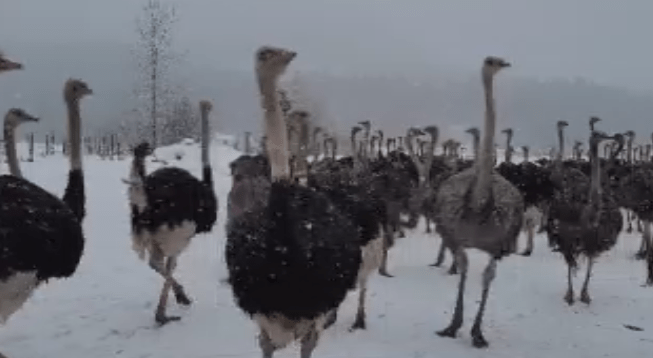They live on a farm near Edgewood, B.C., in the West Kootenay region, but the fate of 400 ostriches is now being decided in a federal courtroom in Vancouver.
A two-day judicial hearing got underway Tuesday morning after the Canadian Food Inspection Agency (CFIA) ordered the entire herd be culled following an avian flu outbreak in December.
“Emotions have been high and it’s been a long road,” said Katie Pasitney of Universal Ostrich Farm. “We do believe…truth and science are going to be heard and we’re fighting for the agricultural industry.”
The outbreak is believed to have come from a flock of ducks that migrated to the farm.
Nearly 70 ostriches died as a result of the outbreak.
According to the farm owners, they lost about 10 per cent of their flock.
At Tuesday’s judicial hearing, lawyers for Universal Ostrich Farm stated there has been so sign of illness at the farm since Jan. 15.
The CFIA’s cull order had a deadline of Feb. 1, but farm owners challenged it and in January received a reprieve from a federal judge pending a judicial review of the case.

Get breaking National news
For news impacting Canada and around the world, sign up for breaking news alerts delivered directly to you when they happen.
“We think CFIA basically applied a default position to these ostriches when they have been infected with a hybrid disease, not a typical HPAI virus,” said Kelowna-based lawyer Lee Turner. “The policies were not properly followed or understood.”

The case has garnered widespread attention, with supporters calling on the government to review the way it handles outbreaks so that animals aren’t unnecessarily killed.
“This affects all of us. This is our food security, and with our food security, I think we all need to take a stand,” said Pasitney.
That’s because the ostriches are part of a program researching antibody production against the avian flu pandemic, which has been wiping out entire chicken farms.
Turner said losing the ostriches comes at cost, potentially a missed opportunity to find a cure for other birds infected by the disease.
“They’re learning a lot from their antibodies and their immune systems,” Turner told Global News. “And so I think we would lose that. We would also have a dangerous precedent for other farmers and ranchers and I think it poses a real threat to the agricultural industry in Canada.”
In addition to saving the ostriches, Pasitney said the fight is to prompt changes to government policies and implement other measures instead of only relying on a single and immediate ‘stamping out’ order.
“They’re supposed to evolve and we just want to make the appropriate changes that would bring forth positive outcomes for others that are in the same fight,” Pasitney said.
The judicial review will continue on Wednesday.

© 2025 Global News, a division of Corus Entertainment Inc.






